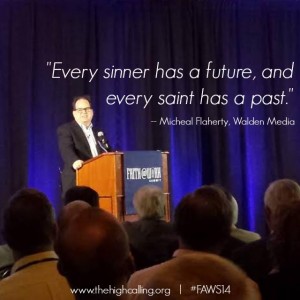
So often faith and work can operate in separate spheres, unbeknownst to even the most well-intentioned of us. But like the man in the parable of the hidden treasure (Matt. 13:44), God works to reclaim the whole field of our lives. When we find Jesus in our work, we again and again discover grace unfolding.
We recently talked with Micheal Flaherty, president and co-founder of Walden Media, about this idea. He highlighted his experience producing the film Amazing Grace. (For those of you who were able to attend last week’s Faith at Work Summit, we’re delighted to report that he’s as entertaining and insightful in person as he was on stage.)
Flaherty described the story of John Newton, a slave trader who became a Christian rather dramatically when he prayed to God to save him from a sinking ship. Newton later penned the famous hymn Amazing Grace. After becoming a Christian, Newton decided he was going to be the most “moral” slave trader in the world. He stopped dancing, drinking and gambling. But for 15 years, he continued trading people for money.
“I think that a lot of us can deceive ourselves if we take on all those external behaviors of what people expect of a Christian, “ Flaherty explained.
We can think that we’re being Christian in our work. But if we’re missing the mark in how we do the work, or if the work itself is questionable (as Newton’s was), we might be in need of a conversion experience.
Thankfully, as Flaherty articulated, “‘I once was blind, but now I see’ is not a one-time event.”–Almost certainly through further encounters with amazing grace, Newton went on to become a supporter of abolition. Bad theology can separate the love of God from our actions, but it doesn’t separate us from the love of God.
We find this in the story of Jephthah in the book of Judges. Jephthah promises God, “If you give the Ammonites into my hands, whatever comes out of the door of my house to meet me when I return in triumph from the Ammonites will be the Lord’s, and I will sacrifice it as a burnt offering.” In keeping with his vow, he ends up sacrificing his only daughter. (Judges 11:30-39) His theology had serious flaws. Had he only inquired of God, or the scribes of his time, Jephthah would have discovered that his sacrifice was not necessary. Despite his error, he is listed in Hebrews as one commended for his faith. Like Moses, he somehow experienced a faith in Christ, one which covered his inaccurate understanding of God.

Flaherty described an instance of finding grace again in his work: “When I was working on Amazing Grace, I felt like it was this really important thing that we could introduce the world to: how someone could be motivated by their faith to change the world. I was so obsessed with doing that film the right way that I was kind of a jerk. And when I would talk to my wife about that and express my frustration, she just said to me, even if this becomes the number one movie in the world, if you lose your connection, and you’re not the kind of person who gets people excited about learning more about Christ, then you’ve failed.”
Even when we think we are serving God in our work, we might be missing God’s heart for us and the people our work affects. But when God calls us to himself, we realize that his amazing grace pursues our whole hearts.













